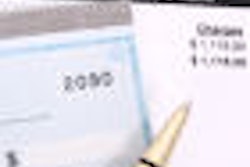
Paul Donadio is 6 feet 4 inches tall, 230 pounds and all Italian. "I don’t carry a baseball bat, but I definitely fit the role for this business," he jokes.
As district manager for the collection agency Transworld Systems, Donadio knows as much as anyone about overdue dental bills. He told a recent audience at the Yankee Dental Congress that such debt is a growing problem, but that most dentists could collect more than they do.
As health and dental insurance costs have increased, the portion of these bills paid out of pocket is now 35 percent, three times higher than in 1980, says Donadio.
But out of 20 high-priority bills an average person must pay, the dental bill ranks 17. "People are far more likely to pay their cable, cellular, and legal bills," says Donadio. "But at least they’ll pay your bill over the vet bill."
Unfortunately, Donadio says, the average recovery rate for medical and dental bills is 10.8 percent. "It’s a pretty high failure rate."
Why are dentists so low on the priority list? "They think you’re rich and don’t need the money."
Many dentists don’t threaten to collect unpaid bills for fear of alienating patients, but the more reluctant they are to collect, the more money they leave on the table.
Debt depreciates a half a percent less for each day you don't collect, Donadio says.
And the average cost of handling delinquent payments internally is $31.60 per account due. That's the cost of making phone calls and sending statements and letters every 90, 120, and 150 days.
Some dentists outsource the problem to collection agencies after a few months, but Donadio says they should do it sooner. "Day 180 is too late. You should outsource it after 30 days. Think of self-pay balances as a stolen car," he says. "The quicker you report it, the more likely you’ll recover it."
Warning signs that you’ll never get your money: The account becomes 60 days overdue; the patient's phone has been disconnected or unlisted; or payments become smaller and/or less frequent. "If you’re collecting 50 percent or less of your accounts receivable every month, you’ve got a problem and you need to do something different."
To lower delinquency, dentists need to change their way of getting paid, says Donadio. You need to state your financial expectations as clearly as your clinical expectations. Have a clear, concise patient financial policy set up for staff to hold onto and for patients to sign. Train staff to be confident in customer-service skills that includes being empathetic to patients' situation but firm on payment. Offer different credit options and payment schedules. Even consider sending them to patient financial counselors.
On bills you send out, state that a service charge or interest rate will be added to outstanding amounts. List a due date instead of an aging date showing how long the payment has been late. Contact overdue accounts more frequently, as often as every 10 days. At the extreme, refuse to treat non-compliant patients until they pay up.
Better yet, collect payment upfront after they get out of the dentist chair, says Donadio. "Don’t ask, ‘How much can you pay?’ or ‘When can you pay?’ Instead, say something like, ‘Your treatment cost $125. We accept cash, check, Visa or Mastercard. Which do you prefer?’ They’re more likely to pay on the spot than if they get a statement."
But if money is not coming, dentists have a few options.
- You could just write off the account, but that means giving up money that belongs to you.
- You could hire an attorney, but the legal fees might be more than you are owed.
- You could go to small claims court, "but a ruling is not effective if the defendant doesn’t show up in court," says Donadio.
Not surprisingly, he recommends that dentists go to a collection agency instead, arguing that the "third party impact" makes a big difference. "They’ll put your letters in a pile and screen your calls. But when the first letter from a collection agency comes in, they’ll most likely send a check for fear of damaging their credit report."
So who do you call? There are 5,000 collection agencies in the U.S. To find a reputable collection agency, look for one that complies with the licensing requirements of your state.
Ask prospective agencies whether they comply with the Fair Debt Collection Practices Act (FDCPA). Their answers should indicate they are knowledgeable about this law, which prohibits them from "abusive and deceptive" conduct when collecting debt (like calling them at home in the middle of the night, or at work).
Ask for client references. Pick one that has been around for a while.
Also ask prospective collectors if they charge a flat fee or a percentage of the collection amount.
Once you turn it over to an agency, you’ll lose control of the account - and a patient relationship. But don’t worry: No agency will work them over with baseball bats. "We are the good guys in this industry," says Donadio.



















